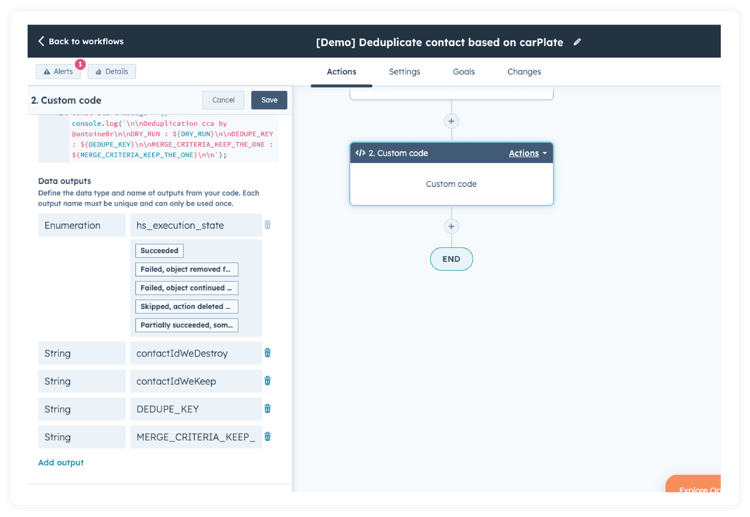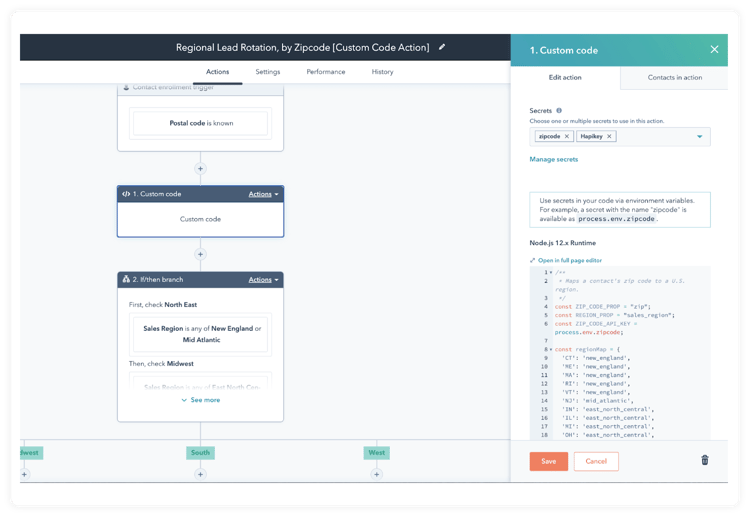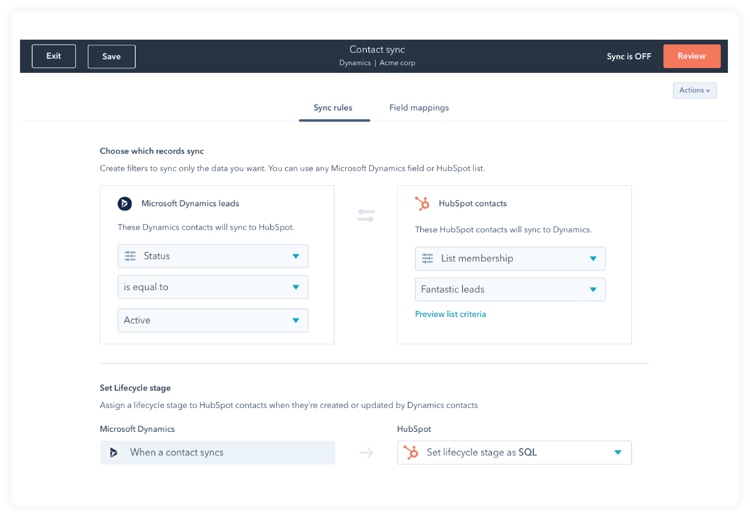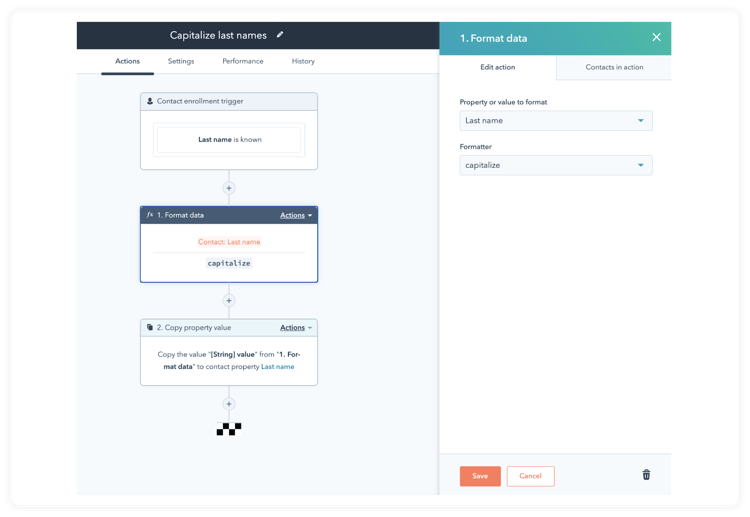How Operations Hub Can Maximize Your HubSpot Investment
In the pursuit of profitable revenue growth, businesses rely on strategic tech investments and efficient data management to drive them forward. That's where HubSpot Operations Hub offers a significant advantage. This unique hub provides a comprehensive set of tools specifically designed to enhance and extend the HubSpot platform, catering to even the most complex enterprise operational needs.
To shed light on the hub's capabilities, we turned to New Breed's SVP of Revenue, Jonathan Burg, and our Director of RevOps, David LaPointe, to answer questions like:
- What sets HubSpot Operations Hub apart from other hubs?
- What are the key features of Operations Hub?
- What are the best use cases for HubSpot Operations Hub?
- When is the right time to invest in Ops Hub to get the most value from the tool?
- How much does Ops Hub cost?
They discuss how it addresses the complexities of enterprise workflows and fosters seamless integration, enhancing overall operational efficiency and agility.
What sets HubSpot Operations Hub apart from other hubs?
Operations Hub distinguishes itself with its advanced 'power utilities,' which significantly extend the capabilities of HubSpot in areas of complex data management and system integration.
While Sales, Marketing, Commerce, and CMS Hubs provide foundational functionality, the Ops Hub plays a pivotal role in optimizing data, workflows, and overall operational efficiency within the tech infrastructure of an organization. This makes it an invaluable asset in maximizing the return on your HubSpot investment.
In fact, the State of HubSpot found that organizations that invest in Ops Hub report significant benefits, such as:
- 94% have seen increased customer acquisition rates.
- 93% noted growth in bookings and revenue.
By focusing on advanced data management, seamless integrations, and system consolidation, it provides revenue teams with the tools they need to optimize their operations, leading to measurable improvements in key KPIs.
What are the key features of Ops Hub?

Data Integrity and Cleanliness
Data integrity lies at the heart of Operations Hub, driving its mission to optimize data management and cleanliness. The platform offers a range of essential features that ensure data accuracy and reliability:
- Advanced data deduplication merges duplicate records based on email addresses for contacts and domain names for companies, including deals, tickets, products, and custom objects, using Record IDs for automated identification and organization.
- Data enrichment and validation rules manage and clean data by enhancing its quality through the addition of relevant external information and ensuring its accuracy and consistency through predefined checks and criteria.
- Data cleaning and automatic correction streamline data management and formatting, reducing manual intervention and maintaining data integrity throughout the organization.

Custom Coded Actions
Custom-coded actions are personalized triggers, workflows, and actions designed to work seamlessly within and outside of the HubSpot ecosystem. Unlike other workflow tools with predefined templates, custom coding offers flexibility to define intricate logic, data transformations, and algorithms around specific objectives. Whether it's a specialized order fulfillment process or a non-standard customer engagement workflow, coded actions enable teams to tailor their systems to fit their exact requirements.
Custom-coded actions are excellent for integration use cases, too. (More on integrations in Ops Hub below).
For example, take a project to enhance lead qualification in Sales Hub using a third-party scoring system. By utilizing a custom-coded action, users can create a personalized workflow that seamlessly connects to a third-party system. This workflow automatically retrieves real-time qualification scores and updates the relevant lead records in HubSpot CRM without any manual intervention. This streamlines lead qualification and empowers sales teams to prioritize and engage with leads efficiently.

Integration Capabilities
Operations Hub serves as a centralized hub for seamlessly managing integrations, offering a user-friendly interface for easy configuration, monitoring, and maintenance.
Equipped with powerful built-in analytics and monitoring tools, teams gain valuable insights into integration performance, data flow, and issue identification, enabling proactive troubleshooting and optimization. This results in streamlined connection management across systems, minimizing admin overhead.
Operations Hub also boasts an extensive range of integration-specific tools, such as:
- Native data sync engine maintains real-time, two-way data synchronization between disparate systems, ensuring consistent updates and accuracy in both external and internal data.
- Advanced data transformation capabilities enable personalized data mappings, triggers, and actions for consistent and meaningful data presentation across systems.

Enhanced Reporting Capabilities
With its powerful reporting capabilities, Ops Hub simplifies the interpretation and communication of data trends and offers comprehensive insights into even the most complex, cross-platform operations with full visibility right from the CRM.
-
Custom Dashboards offer a tailored reporting experience while providing a comprehensive, unified view of data from multiple sources. Users can easily customize their dashboards by adding widgets to display key metrics, charts, and interactive visuals.
-
Build-in automation allows users to create personalized metrics based on customer attributes, interactions, and timeframes, providing valuable insights into customer behavior and performance. With timely communication capabilities and proactive issue resolution, teams can stay ahead of any challenges.
-
Performance and attribution tracking allows sales and marketing teams to monitor revenue targets, track against customer acquisition objectives, and gain insights into the sales funnel. It also enables the use of multi-touch attribution models to determine the impact of marketing efforts on conversions and revenue.
What are the best use cases for HubSpot Operations Hub?
Operations Hub excels in improving data migration, integration, and management. It simplifies these processes through in-system data manipulation and cleaning, reducing manual intervention and the need for external tools. Here are the common Ops Hub use cases we apply as internal RevOps strategy and across our customer base:
1. Managing complex integrations without external middleware.
Ops Hub manages complex and customized integrations directly within the hub ecosystem. This capability allows for seamless integration of third-party apps and systems that do not have native HubSpot integrations, all without the need for external middleware. This feature streamlines the process of syncing and managing data across various platforms while extending HubSpot's core capabilities and enhancing overall operational efficiency.
Benefit: Businesses can tailor their tech stack to their specific needs, ensuring a more cohesive and efficient operational process, while reducing the reliance on and costs associated with additional integration tools.
2. Simplifying the tech stack through system consolidation.
System consolidation is a significant advantage of Ops Hub. It allows organizations to streamline their tech stack by seamlessly merging data from different systems into HubSpot, even if they use alternative marketing automation, CRM, or ERP systems alongside the hub suite. This reduces the number of tools needed, declutters the tech stack, and minimizes the complexity of managing multiple platforms.
Benefit: By consolidating their systems, companies can achieve a more streamlined and manageable operational workflow, leading to increased productivity, reduced costs, and a more focused approach to tech stack management.
3. Efficiently managing data from different systems in HubSpot.
Ops Hub simplifies a process that is traditionally manual and time-consuming, thereby reducing errors and saving time. It ensures the accuracy and consistency of data across various platforms, which is crucial for reliable analytics and informed decision-making. This feature includes data validation, cleansing, and synchronization, allowing businesses to maintain high data quality effortlessly.
Benefit: Improved data management leads to better insights, more effective strategies, and accurate forecasting, contributing to enhanced business growth, customer understanding, and overall operational excellence.
When is the right time to invest in Ops Hub to get the most value from the tool?
The timing of integrating Operations Hub into a business can significantly impact the value it delivers.
Early adoption in business processes:
Ideal during the initial setup of workflows and data infrastructure, as it helps in creating a streamlined and efficient operational foundation from the start. This is particularly advantageous for new businesses or those in the process of restructuring their operations, such as during a merger and acquisition.
During operations scaling phases:
As a business grows, its operational complexities increase. Integrating Operations Hub during scaling phases helps manage these complexities more effectively. It's optimal for businesses in a rapid growth phase or expanding their market presence.
In response to data management and integration challenges:
For businesses experiencing issues with data inconsistency, integration challenges, or workflow inefficiencies, introducing Operations Hub can provide immediate benefits. It addresses these specific challenges head-on, improving overall operational efficiency.
By simplifying complex tasks associated with disparate systems, Operations Hub promotes a unified operational workflow, fostering data consistency, workflow efficiency, and a harmonious operational ecosystem.
HubSpot Operations Hub pricing and tiers:
Operations Hub Starter
Pricing:
- Starts at $45/month.
- Billed annually at $600, discounted to $540/year.
Payment Options:
- Pay Monthly: Commit monthly.
- Pay Upfront: Save 10% with annual commitment.
Features:
- Free tools with increased limits.
- Data sync.
- HubSpot payments (U.S. only).
- Historical sync.
- Email health reporting.
- Default field mappings.
- Email reply tracking.
Operations Hub Professional
Pricing:
- Starts at $720/month.
- Billed annually at $9,600, discounted to $8,640/year.
Payment Options:
- Pay Monthly: Commit annually.
- Pay Upfront: Save 10% with annual commitment.
Features:
- Includes all Starter features plus:
- Data health trends.
- Data quality command center.
- Programmable automation.
- Scheduled workflow triggers.
- AI-powered data formatting recommendations.
- Bulk duplicate management.
Operations Hub Enterprise
Pricing:
- Starts at $2,000/month.
- Billed annually at $24,000/year.
Features:
- Includes all Professional features plus:
- Custom objects.
- Standard sandbox account.
- Datasets.
- Snowflake data share.
- Advanced data calculations and prep.
- Advanced permissions.
Elizaveta Shkurina
Sr Creative Strategist specializing in B2B brand creation, sales enablement, and SaaS demand generation. With 8 years of experience, she excels in driving ROI and revenue-driven KPIs through collaborative innovation.





